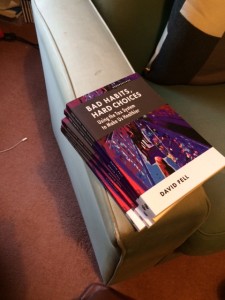They’ve arrived! My copies of [amazon_link id=”1907994505″ target=”_blank” ]David Fell’s new book[/amazon_link] in the Perspectives series on how to design and implement a smarter tax system.

Bad Habits, Hard Choices
I wrote about it yesterday, and one comment on the post observed that surely taxing unhealthy foods more and healthy foods less is regressive, because people with not much income have unhealthier diets.
Yes indeed, if you assume people’s behaviour does not change at all in response to either price incentives or other incentives. David argues in the book that the present structure is unfair exactly because it harms the health of people with lower incomes. He draws also on behavioural economics to discuss how being nudged not only by post-tax prices but also by packaging information etc could encourage people to make healthier choices. Koen’s comment also argued that we don’t know which foods are unhealthy and this might not be inherent – as indeed has been said in the context of the sugar tax debate. A little is ok, it’s eating/drinking a lot that’s the problem. The book does also address this in its discussion of implementation, strongly advocating some trial and error.
I have reservations about behavioural economics and paternalism, or rather about the gung-ho enthusiasm with which economists are wielding this new tool in our toybox, but I do think [amazon_link id=”1907994505″ target=”_blank” ]Bad Habits, Hard Choices [/amazon_link]makes a strong case for restructuring VAT. And this is surely a good moment to be thinking seriously about the tax system as a whole and whether it’s helping or harming society.
